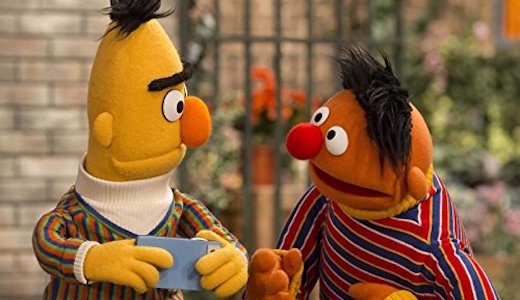OK, so this blog’s title is a little click-baity, but it’s still worth thinking about for a bit.
The Internet and Sesame Street are both celebrating their golden 50th. They popped into being back in the fall of 1969 (on Oct. 29 and Nov. 10 respectively). Each required years of planning and hard work. Their creators certainly had lofty hopes for their creations—dreams that both exceeded beyond imagination. And both, in their best shining city on a hill form, help kids in wonderful ways and make a parent’s life so much easier.
Until, of course, things turn ugly and someone gets poked in the eye.
So, if we put the two 50-year-olds toe-to-toe in the ring and asked them to battle out which one was better or worse for kids, how might it play out? Who would emerge with the good-guy gold medal or get the bad-bully boot? Let’s start by laying out a few of the facts about the two contenders.
First of all, it’s estimated that more that 86 million Americans, young and old, have watched Sesame Street since it first debuted. Personally, I think that estimate is probably low since nearly everybody you meet can instantly tell you their favorite Sesame Street character. Try it. I asked a bunch of friends and only one said he wasn’t sure. And that was because … he grew up in Africa.
How many people have visited the internet? Well, that would be nearly everybody. In fact, over the last 20 years or so, internet use has exploded all over the world. And kids have become one of the biggest impacted demographics. It’s rare these days to see kindergartners who aren’t messing with some kind of computer and dabbling in the internet soon after. Hey, a study by the U.S. Department of Education stated that 23% of nursery school kids know how to access the internet.
In any case, both contenders have had a huge reach. And as far as their benefit to kids goes, well, that’s been pretty widespread, too.
Sesame Street has long been known for making kids smarter, kinder and a little stronger when it comes to dealing with the tough stuff of life. The show’s creators have done that by helping kids closely identify with the puppet characters, seeing them as little fur- and cloth-covered friends. A sweet-munching Cookie Monster can then help teach a kid-friendly lesson about controlling one’s impulses. Elmo can kindly comfort someone who’s sad. The Count can encourage a love for, well, counting.
The internet does a pretty doggone good job at all that stuff, too. You can access free books, free music, free math games, and free videos that teach you how to take care of a pet or read the maps of the world. Hey, you can see countries and people all over the world on the web. Kids get a chance to see how other children in faraway places like China or India live. How do they get to school? What do they eat for lunch?
OK, ok, so they’re both pretty good. But what about the bad? How have these two heavy hitters badly influenced our precious tykes?
And I can already see you sitting up, rolling your eyes and nodding your head. You think you know the answer to this one. What could possibly be worse than the internet with its unending vomit of online social network trolls, society-corrupting discourse and … porn!
Well, you may not remember, but good old Sesame Street has had its less-than-sunny days, too. Early on, experts worried that, just like the internet, the Sesame Street show and its quick, constantly shifting skits and songs would actually shorten the attention span of our little ones and cause a rise in ADHD diagnoses. Back in the early days, old Cookie Monster made puffing on a pipe look like lots of fun. The first “black” Sesame Street character in the ‘70s was called out for promoting racial stereotypes. Oh, and let’s not forget the many questions about Bert and Ernie’s sexuality. The puppet spoofs of very adult shows like Mad Men and Game of Thrones raised some This is for kids? eyebrows. And then there was the massive parental protests over pop-star Katy Perry’s, uh, overexposure during a song with Elmo.
The list of Sesame Street boo-boos stretches on. And since moving from PBS to HBO (though new episodes still make their way to PBS eventually, too), who knows where the kid skits and spoofs will go.
So, I guess that’s the answer then: Sesame Street and the internet are both bad! Let’s rip out the routers, turn off the power and shutter the windows, because it’s all going south.
I’m only joking, of course. My click-baity lede is actually leading to this Plugged In-worthy statement: No matter what comes your way these days, no matter how long it’s been around or how lofty its initial intentions, everything can and likely will have its flaws. Every show and media thingamajiggy is made and populated by we fallible men and women, and it will likely sometimes disappoint you and your family.
You, dear Mom, Dad, Uncle, Grandma and older brother, sister and second cousin are the safeguards who’ll keep the little ones free from harm. When you watch, pay attention, monitor, discern, get involved, seek out the best, and sometimes just turn off the TV and read a book with your young loved ones, then their chances of escaping the worst of the worst are going to be better than good.
Hey, Sesame Street and the internet sure ain’t gonna do any of that for ya’.






Recent Comments